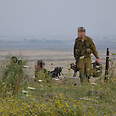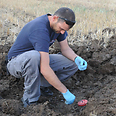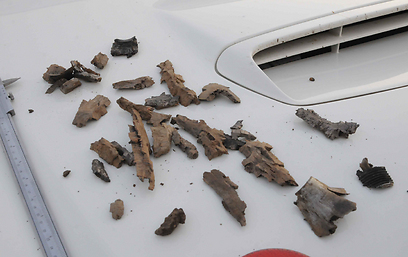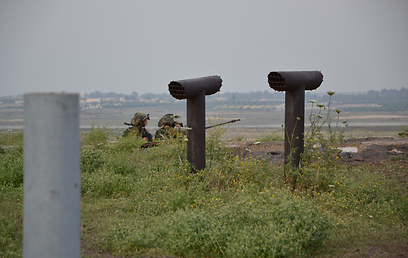

On Tuesday morning, the battles between the Syrian army and rebels trying to overthrown President Bashar Assad's regime spilled into Israel once again, when a mortar shell landed near the border fence in the southern Golan Heights. There were no reports of injuries or damage.
Related stories:
- Iran denies reports its weapons targeted in Syria
- Syrian rebels increasingly frustrated
Op-ed: Falling into Assad's trap
On Monday afternoon, two mortar shells exploded just several meters away from the homes of Moshav Ramat Magshimim in the southern Golan Heights. Some of the residents say they are concerned, while others are more indifferent.
This time, as opposed to some of the previous incident, the Israel Defense Forces did not respond with missile fire, likely due to the tense situation in the region in light of the reported Israeli strike in Syria last week.
After Monday's incident, some of the residents went out to the Tel Saki post, where massive military and police forces gathered as well. Alber Anconina, one of the residents, said that "the shots are really strong. It sounds like a serious battle there, inside Syria."
Dalia Paludis, one of the founders of Ramat Magshimim, said that she and her neighbors were mostly used to the serenity. "For 40 years we have mainly had peace and quiet here, but for two years now we have been hearing the battles. Recently it has become a real catastrophe. Because of the proximity it sounds like they are firing on our doorstep."

Mortar shells in Israeli community (Photo: Avihu Shapira)

Ramat Magshimim, Monday (Photo: Shuli Anconina)
The residents heard Monday's mortars very well, as the battles in Syria continued in full force. "Clearly, you keep tilting your ears to that direction. You remain alert. Inside your head you realize that these are not just sounds you're hearing. Someone is being hurt by these bombings. Even if it's the enemy, they are human beings, children," Paludis added.
"Here you also see the world's hypocrisy when it fails to intervene and put an end to it. We believe the government and the army are always on the lookout, and we trust them to know when action should be taken."
'It's the calmest area in Israel'
Sara Dagan, head of the moshav's emergency team, has been living in the community for the past 40 years too. Until recently, she says, "it was the quietest area in Israel. We are not restricted in any way, people go to work and the children go to school. We are following the situation like any other citizen in the State of Israel."
On Monday, however, she began receiving phone calls from relatives inquiring if she was okay. "The booms we here don't bother me because it's on the other side of the border," she says. "I am sure that if something concerning happens, someone will update me. The army is on the lookout and we are in touch with the local council's security department.
"On a personal level, I am not worried. It's troubling on the basic level, but no one is getting up and saying, 'I'm leaving until the calm is restored.' People are continuing their routine life. There is no fear that something will happen here."
Ohad Golan, who has two children, says he has been hearing the blast sounds for the past six months. "There is fear in the air, but it's not translated into action. Every few days there are battles in the nearby villages. In the past two days there massive fire."
Yet he adds that "this is the calmest border in the country with a pastoral atmosphere. You feel the military's presence, but there's no pressure here."
Ahiya Raved contributed to this report
- Follow Ynetnews on Facebook and Twitter
- Receive Ynetnews updates
directly to your desktop















